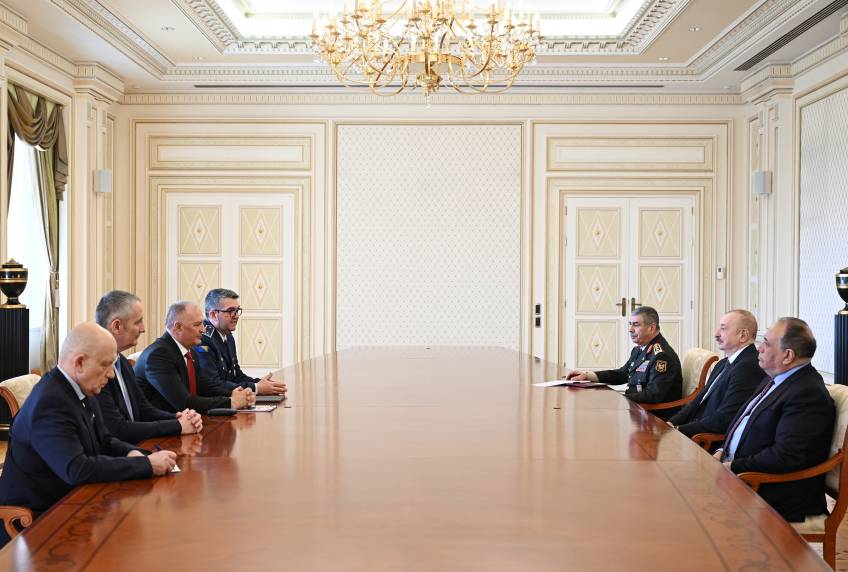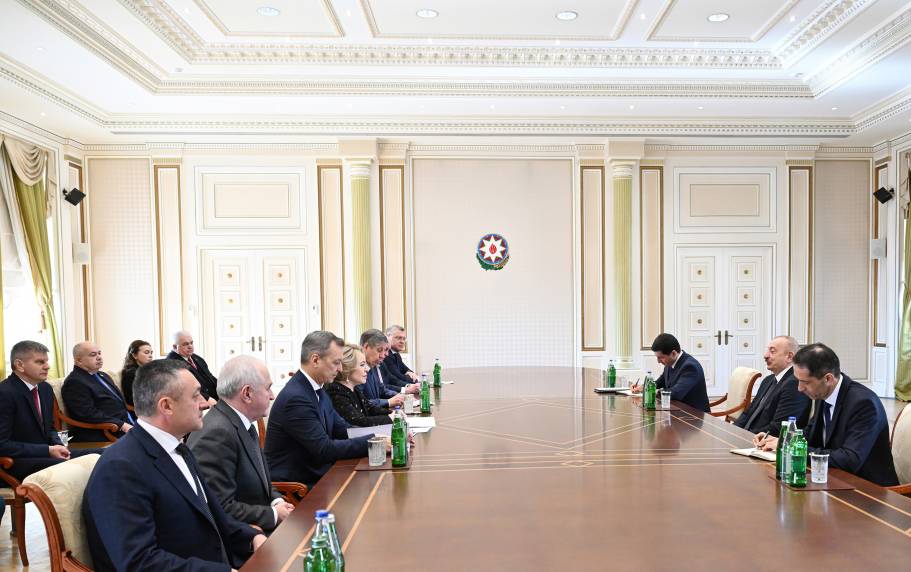12:23
Azərbaycan Respublikasının Prezidenti İlham Əliyev və birinci xanım Mehriban Əliyeva martın 18-də Ağdərə rayonunun Suqovuşan kəndində məscidin açılışında iştirak ediblər.
18 mart 2025, 12:23
The Jakarta Post
Monday, April 18, 2011
ABDUL KHALIK
The Azerbaijani government held a world forum for intercultural dialogue from April 7-9 in Baku. The Jakarta Post’s Abdul Khalik was invited to the forum. Below is his report.
While Europe is struggling with an influx of immigrants, perceived threats to its identity and rising ultra-nationalistic sentiments across the continent, Azerbaijan is urging the world to give multiculturalism
a chance.
During its three-day World Forum of Intercultural Dialogue in Baku that drew more than 400 figures from 40 countries, including ministers, experts and journalists, the Caspian republic portrayed itself as a successful multicultural society, with all its religions coexisting peacefully.
The forum — supported by UNESCO, the UN Alliance of Civilizations, the Council of Europe, the North-South Center of the Council of Europe and the Islamic Educational, Scientific and Cultural Organization (ISESCO) — underlined the need for intercultural dialogue and to avoid violence amid the revolutions in the Middle East and civil war in Libya.
Azerbaijani President Ilham Aliyev said during the opening of the forum that Azerbaijan, a Muslim-majority nation, could serve as an example of ethnic and religious tolerance for the world amid ongoing discussions about the importance of cultural diversity.
Aliyev said his nation possessed a long-standing experience concerning the coexistence of people representing different cultures and faiths.
“Representatives of various nations and creeds have always lived here as one family and equally defended the state. No ethnic or religious confrontations or even misunderstandings have existed here. We want our experience to be studied and to be of interest to other countries because this is such a rare experience,” Aliyev said.
Aliyev said that Azerbaijan, a member of the Council of Europe, was a nation that might be able to link Eastern and Western civilizations by holding intercultural debates.
“It was Azerbaijan that made the first democratic republic in the Orient,” Aliyev said. “The first Oriental theater was established here, the first opera [was] composed, and women were granted voting rights. Our strength lies in ethnic and religious diversity.”
The Azerbaijani leader said that programs aimed at promoting a multicultural society be implemented in every country.
“We want all nations [and] people of different faiths to forge tight bonds and to be able to discuss various issues openly.”
Renowned philosopher Hans Kochler of University of Innsbruck in Austria said the forum was a timely, as the Western Europe was becoming an intolerant society, with many ultra-right groups and politicians gaining electoral support.
“At the very least, Baku can show Europe that the spirit of multiculturalism is still very much supported by most people in the world,” he told The Jakarta Post on the sidelines of the forum.
Experts and officials in the forum agreed that the world in recent years, especially the Middle East, has been marked by escalating violence — a consequence of a failure of political and religious leaders to promote dialogue.
“We should fight all sorts of extremism, wherever [they] come from — East, West, South or North — and work on the human principles that bring the human family together,” ISESCO director general Abdulaziz Othman Altwaijri said during the forum.
Altwaijri said that the forum’s messages should be disseminated through curricula in schools, media, cultural forums and religious speeches in synagogues, churches and mosques.
The forum participants also heard speakers who reiterated the key role played by women and their status in society to push for dialogue between cultures and civilizations.
“Women in Azerbaijan are represented in all fields, [including] science, politics, healthcare and education. I think that in this way, as in many others, Azerbaijan provides a good example,” Mehriban Aliyeva, first lady and president of the Heydar Aliyev Foundation, said.
Anne-Marie Lizin, honorary speaker of the Belgium Senate added her voice to the debate.
“We’re talking here at this forum about the dialogue of civilizations, but we also see calls for revolution in the Arab world, calls for change — and in fact the real test will be whether that change will be for everybody or will it only be men and not women. We hope this forum will allow us to debate this issue, and to show that women’s rights are essential for liberty in the Arabic world.”
UNESCO assistant director general Hans D’Orville said Azerbaijan was located at the heart of the East and West and at the crossroads of different civilizations.
“The overall picture allows this country to be seen as a venue for cultural diversity and furthering inter-cultural dialogue. The dialogue that started in Azerbaijan can be continued elsewhere through various forums in the future.”
D’Orville added that it was important to make an effort toward improving religious and ethnic tolerance in education.
A China’s representative agreed that the habit of dialogue and beliefs in multiculturalism should start from the school and family, while stressing the importance of the media to disseminate values.
“We in China have started to teach our youngsters in schools to respect different groups — Muslims, Christian or others — within our society,” he said.
Karl-Erik Norrman, the secretary-general of the European Cultural Parliament said there must be a more positive approach throughout Europe than what is presently being witnessed.
“It’s perhaps going too far to say that [multiculturalism] has failed, but it has been a kind of a romantic, innocent attitude to multiculturalism. Rather than seeing it as a potential, governments have forgotten to claim and defend their own values in such a dialogueue,” he said at the Forum.
Robert Palmer, the director of Culture and Cultural and Natural Heritage of the Council of Europe, said that the challenges in the world today were many, including increase of discrimination, unemployment, economic inequalities and a resistance to understanding the basic principles of living together.
“That’s the fundamental challenge in our world today: How can we create a basis of common principles, of common values, and a way of understanding each other to live in harmony across the world?”
The deputy head of the Russian Academy of Sciences’ Philosophy Institute, Andrey Smirnov, said that Russia cannot risk anti-Muslim sentiment.
“Periodic waves of inter-religious differences in Russia, particularly in Moscow, are connected, on the one hand, with deliberate activity by the parties concerned and, on the other hand, are a natural process difficult to control,” Smirnov told the forum.
“It is known that there was a plan, according to which Chechnya was to serve as a fuse to light the tinder box of other representatives of the Muslim community of Russia. As a result of this explosion, Russia was to split in two.
But this plan did not work, since Russian Muslims showed loyalty. If external powers, concerned with the destabilization of Russia, push Muslims towards extremism, it will be very dangerous. For this reason, Russia cannot even contemplate anti-Muslim sentiments,” Smirnov said.
Azərbaycan Respublikasının Prezidenti İlham Əliyev və birinci xanım Mehriban Əliyeva martın 18-də Ağdərə rayonunun Suqovuşan kəndində məscidin açılışında iştirak ediblər.
18 mart 2025, 12:23Azərbaycan Respublikasının Prezidenti İlham Əliyev və birinci xanım Mehriban Əliyeva martın 18-də Ağdərə rayonunun Suqovuşan kəndində inşa olunan yaşayış kompleksinin istifadəyə verilməsi mərasimində iştirak edib, yeni mənzillərə...
18 mart 2025, 12:11Azərbaycan Respublikasının Prezidenti İlham Əliyev və birinci xanım Mehriban Əliyeva martın 18-də Ağdərə rayonunun Həsənriz kəndində buraya köçən bir qrup sakinlə görüşüb, fərdi evlərin və infrastrukturun bərpası sahəsində görülən...
18 mart 2025, 10:26Martın 18-də Azərbaycan Respublikasının Prezidenti İlham Əliyev və birinci xanım Mehriban Əliyeva Sərsəng su anbarından Ağdərə rayonunun Umudlu kəndinə gedən avtomobil yolunun yenidənqurmadan sonra açılışında iştirak ediblər.
Azərbaycan...
18 mart 2025, 09:38Hörmətli xanım Prezident,
Koçani şəhərində baş vermiş faciəli hadisə nəticəsində çox sayda insanın həlak olması və xəsarət alması...
17 mart 2025, 15:20Azərbaycan Respublikası Konstitusiyasının 109-cu maddəsinin 23-cü bəndini rəhbər tutaraq qərara alıram:
Azərbaycan Respublikasının prokurorluq orqanlarında...
17 mart 2025, 12:46

Azərbaycan Respublikası Konstitusiyasının 109-cu maddəsinin 32-ci bəndini rəhbər tutaraq qərara alıram:
“Azərenerji” Açıq Səhmdar Cəmiyyətində (bundan sonra – Cəmiyyət) ümumi yığıncağın səlahiyyətlərinin həyata keçirilməsi...
17 mart 2025, 10:40Martın 15-də Moskvada qeyri-rəsmi görüş keçirən Rusiya Federasiyasının Prezidenti Vladimir Putin, Belarus Respublikasının Prezidenti Aleksandr Lukaşenko və Tacikistan Respublikasının Prezidenti Emoməli Rəhmon Azərbaycan Respublikasının...
15 mart 2025, 20:00Azərbaycan Respublikası Konstitusiyasının 109-cu maddəsinin 23-cü bəndini rəhbər tutaraq qərara alıram:
Xidməti vəzifələrini yerinə yetirərkən fərqləndiklərinə görə Azərbaycan Respublikası Strateji Obyektlərin Mühafizəsi Dövlət...
15 mart 2025, 11:18Azərbaycan Respublikası Konstitusiyasının 109-cu maddəsinin 23-cü bəndini rəhbər tutaraq qərara alıram:
Azərbaycan Respublikası ilə Fələstin Dövləti arasında dostluq və...
15 mart 2025, 11:16